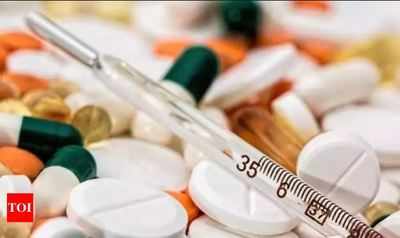- News
- NRI News
- US & Canada News
- Indian-origin cardiologist pleads guilty to distributing highly addictive prescription drugs
This story is from November 28, 2018
Indian-origin cardiologist pleads guilty to distributing highly addictive prescription drugs

Representative image
NEW YORK: An Indian-American cardiologist has pleaded guilty to distributing highly addictive prescription drugs to patients without any medical purpose, contributing to the nation's opioid epidemic.
Dr Devendra Patel, 59, owned and operated the Northeastern Nevada Cardiology and was indicted by a grand jury in December, 2017. US district judge Larry Hicks accepted the guilty plea.
The investigation revealed Patel unlawfully prescribed opioids and other prescription narcotics to patients for financial gain.As part of his plea, Patel admitted that, between September 2015 and February 2016, he prescribed Oxycodone and Hydrocodone to patients without a legitimate medical purpose and outside the usual course of professional practice.
Prosecutors said these prescriptions were in direct violation of his duty as a long-term licensed medical doctor.
He is scheduled to be sentenced in March, 2019 and faces a maximum penalty of 20 years in prison and a fine of one million dollars.
According to the Centres for Disease Control and Prevention (CDC), America's public health institute, approximately 115 Americans die every day of an opioid-related overdose.
In 2016, there were 408 opioid-related deaths in Nevada, according to the Nevada Department of Health and Human Services. In 2016, Nevada's per capita prescription rate for opioids was 87/100 residents.
Nevada ranked as the sixth highest state for the number of milligrams of opioids distributed per adult, according to a study by the Drug Enforcement Administration (DEA).
From 2010 to 2016, opioid-related hospitalisations have increased by 136 per cent in emergency room encounters and 84 per cent in in-patient admissions. During this period, 85 per cent of all opioid-related deaths in Nevada were deemed accidents, according to the National Institute on Drug Abuse Study for Nevada.
Dr Devendra Patel, 59, owned and operated the Northeastern Nevada Cardiology and was indicted by a grand jury in December, 2017. US district judge Larry Hicks accepted the guilty plea.
The investigation revealed Patel unlawfully prescribed opioids and other prescription narcotics to patients for financial gain.As part of his plea, Patel admitted that, between September 2015 and February 2016, he prescribed Oxycodone and Hydrocodone to patients without a legitimate medical purpose and outside the usual course of professional practice.
Prosecutors said these prescriptions were in direct violation of his duty as a long-term licensed medical doctor.
As a result of his actions, Patel's license was suspended upon his arrest in December, 2017. Patel's prescribing practices allowed him to see a high volume of patients and easily prescribe and sell the opioids, while not addressing any legitimate medical concerns of his patients.
He is scheduled to be sentenced in March, 2019 and faces a maximum penalty of 20 years in prison and a fine of one million dollars.
According to the Centres for Disease Control and Prevention (CDC), America's public health institute, approximately 115 Americans die every day of an opioid-related overdose.
In 2016, there were 408 opioid-related deaths in Nevada, according to the Nevada Department of Health and Human Services. In 2016, Nevada's per capita prescription rate for opioids was 87/100 residents.
Nevada ranked as the sixth highest state for the number of milligrams of opioids distributed per adult, according to a study by the Drug Enforcement Administration (DEA).
From 2010 to 2016, opioid-related hospitalisations have increased by 136 per cent in emergency room encounters and 84 per cent in in-patient admissions. During this period, 85 per cent of all opioid-related deaths in Nevada were deemed accidents, according to the National Institute on Drug Abuse Study for Nevada.
End of Article
FOLLOW US ON SOCIAL MEDIA
